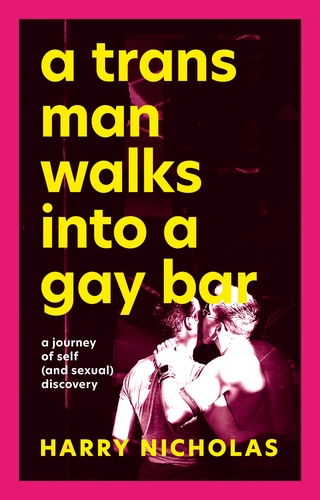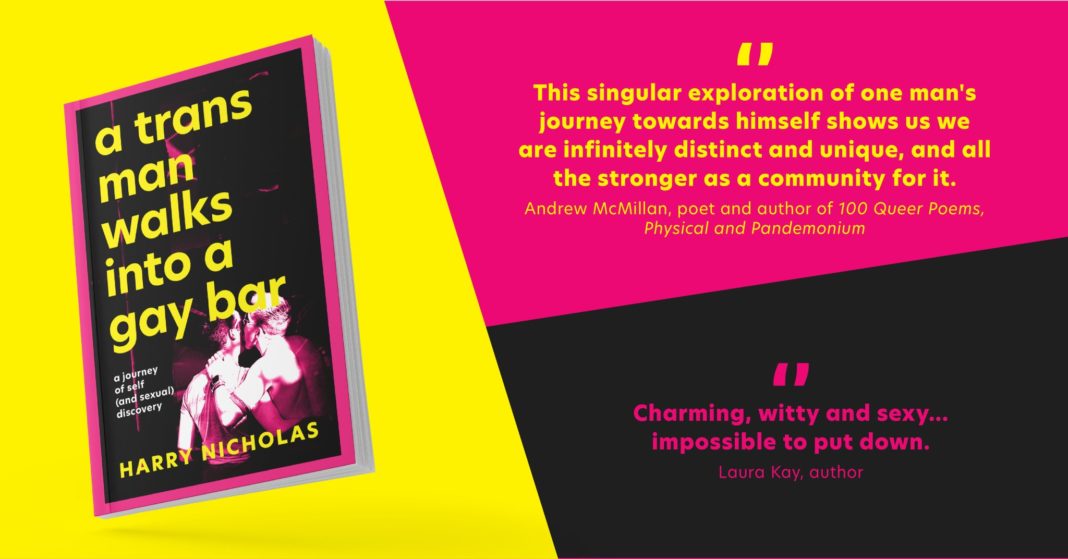A Trans Man Walks Into a Gay Bar: A Journey of Self (and Sexual) Discovery by Harry Nicholas is available to buy now. Reviewing the book Elia Cugini writes;
A rich and brilliant corpus of trans writing has formed over the past century, and particularly over the past decade, but some trans experiences are still scarcely depicted in print. One is the experience of gay trans men, whose presence in trans fiction and memoir is curiously rarer than their straight or lesbian counterparts.
Trans theory and media through the 90s and 2000s focused heavily on ‘border wars’ between butch lesbians and trans men, meaning that the most visible routes into transmasculinity were available to those who came through lesbianism, while medical gatekeepers took transmascs’ attraction to men as evidence against transness; gay trans men, therefore, have historically had a much murkier route to travel to discover their transness at all. Meanwhile, there are various talented gay and queer transmascs writing popular fiction, such as Calvin Kasulke, Liam Konemann, Aiden Thomas and Kacen Callender, but their novels are YA or are about cis gay men. We are still waiting for what some among us are half-jokingly calling ‘The Great Transfag Novel.’ (James Frankie Thomas’s Idlewild will be a contender for the title, but it’s not out until September.)
Queer trans men have our pockets of representation, of course: other trans people introduced me to Oshima in Kafka on the Shore and to Max Delsohn’s ‘Crawl’, linked me Henry Hanson’s short film ‘Bros Before’ and Jackson King’s Irresistible Damage magazine, told me about Lou Sullivan’s diaries. But it still feels deeply unexpected and exciting when a book angled directly at trans men into men gets published, let alone one titled A Trans Man Walks Into a Gay Bar.
Harry Nicholas’ new memoir opens after his breakup with his long-term ex-girlfriend, and closes at him embarking on a new relationship with his boyfriend, Liam. That might make it sound like a linear memoir, but it’s more of a hybrid of memoir, cultural exploration, how-to guide and low-key manifesto; it bounces around, moving from ‘Grindr’ to ‘Passing’ to ‘When A Stranger Called Me A Faggot.’ The book is at times a breezy, funny read (‘They don’t do ‘Congratulations on getting your tits lobbed off’ cards in The Card Factory’), but it has a serious core: there’s a real pain to experiences like being denied emergency contraception because the pharmacist says ‘the woman’ needs to come get it, or having your mother ask ‘But who will love you?’ after you come out, or realising that you’re compulsively mowing through hookups because you’re scared of being lonely or rejected.

The shame and pain in the book isn’t unmanageable or unique, however; A Trans Man Walks Into a Gay Bar is committed to the joy and community of gay trans life, and to the idea that other queer people can and will show up for you, even if they can’t understand everything about you.
It’s old hat at this point to say ‘the old, conservative trans memoir just talks about transitioning, and the new, radical trans memoir talks about life after surgery,’ and that’s always been a simplistic take on the evolution of the genre, but it is nice to see a book about a journey of self-discovery that starts years into transition, and that strives to particularise trans experience without making it exceptional and unrelatable to cis gay manhood. The breakup at the book’s start isn’t a result of Nicholas’ transness; instead, it’s two queer people who started dating young and who both realise they need to leave to explore their queerness, a narrative common to both cis and trans queer people. The intimacy and history and cultural joy explored in the book is a shared gay intimacy, history, joy.
If anything, I think there are even more commonalities between cis and trans queer manhood than Nicholas explicitly explores, such as body shape and insecurity; trans guys experience it to a greater and more stigmatised degree, but I’ve scarcely met a cis man who doesn’t think his body is out of place among men in some way. There are even cis guys who’ve gotten top surgery!
A Trans Man Walks Into a Gay Bar is full of careful writing and insight, and I devoured it in a couple of days and felt genuinely touched by it. I did read for blind spots, though, and as with any memoir written in your mid-twenties, there were a few. There wasn’t anything in it that I found seriously jarring, but I raised an eyebrow at a description of testosterone as a ‘strong and dominant hormone’ (which reads more as an overgeneralisation of Nicholas’ own experience of going ‘from girl to otter’ in two years, and unwittingly bolsters the incorrect perception of oestrogen as ‘weak’). The book cursorily mentions T4T once and dismisses it as restrictive, which felt like it pre-emptively shut off some potential interesting conversations about different ways transmascs and transfemmes interact with gay culture. Transfemmes aren’t much of a presence in the book at all, really. And the tone of the book is earnest, casual, and flamboyantly kitschy in a way that occasionally evokes a gay youth pastor, which will suit some and not others.
A Trans Man Walks Into a Gay Bar is sweet, heartfelt, insightful, a seriously useful and novel resource for both cis and trans people, and a powerful counter to cultural narratives that gay trans men are fantasists and perverts who can’t actually do gayness, let alone find gay love, community and joy. You can prime a thousand different arguments against that kind of story about yourself, but it’s much less tiring and more restorative to see other trans guys having gay sex, being hot and happy, and modelling a route into gay trans life.
This article was funded by LGBT+ Futures: Equity Fund is a two-year £786,000 partnership between Consortium and The National Lottery Community Fund, designed to help community-led and grassroot organisations supporting some of the most under-represented and marginalised LGBT+ communities. Read more here.















